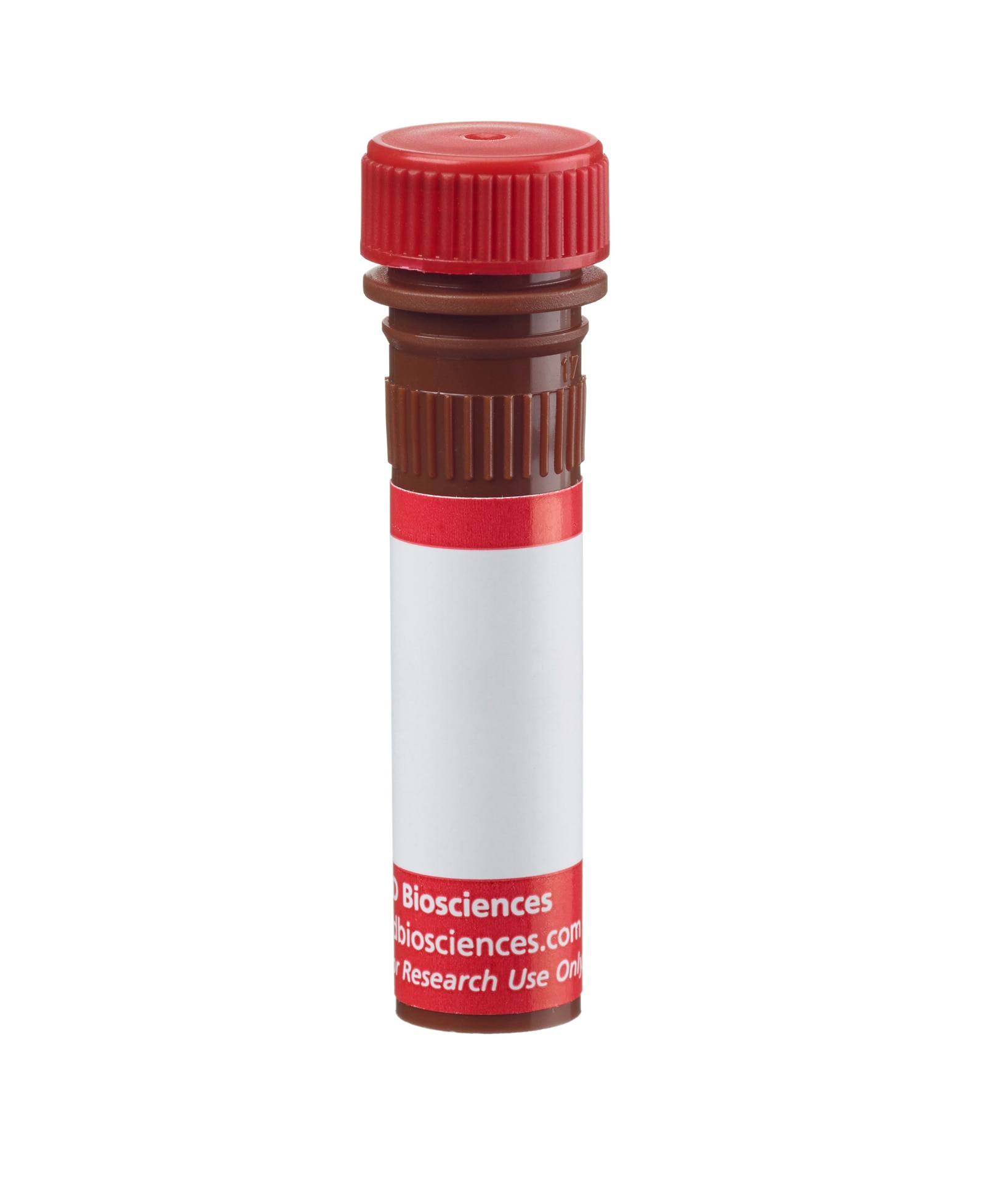Old Browser
This page has been recently translated and is available in French now.
Looks like you're visiting us from {countryName}.
Would you like to stay on the current country site or be switched to your country?




Flow cytometric analysis of ErbB3 expression on human breast adenocarcinoma cell line. MCF-7 cells (ATCC HTB-22) were detached with BD Accutase™ Cell Detachment Solution (Cat. No. 561527) and stained with either Alexa Fluor® 647 Mouse IgG1 κ Isotype Control (Cat. No. 565571; dashed line histogram) or Alexa Fluor® 647 Mouse Anti-ErbB3 (HER-3) (Cat. No. 567044; solid line histogram) at 0.5 μg/test. 7-Amino-Actinomycin D Solution (7-AAD, Cat. No. 559925) was added to the cells right before analysis. The fluorescence histogram showing ErbB3 (HER3) expression (or Ig Isotype control staining) was derived from gated events with the light-scatter characteristics of viable (7-AAD-negative) cells. Flow cytometry and data analysis were performed using a BD LSRFortessa™ X20 Cell Analyzer System and FlowJo™ software. Data shown on this Technical Data Sheet are not lot specific.


BD Pharmingen™ Alexa Fluor® 647 Mouse Anti-Human ErbB3 (HER-3)

Regulatory Status Legend
Any use of products other than the permitted use without the express written authorization of Becton, Dickinson and Company is strictly prohibited.
Preparation And Storage
Recommended Assay Procedures
BD™ CompBeads can be used as surrogates to assess fluorescence spillover (Compensation). When fluorochrome conjugated antibodies are bound to CompBeads, they have spectral properties very similar to cells. However, for some fluorochromes there can be small differences in spectral emissions compared to cells, resulting in spillover values that differ when compared to biological controls. It is strongly recommended that when using a reagent for the first time, users compare the spillover on cell and CompBead to ensure that BD Comp beads are appropriate for your specific cellular application.
Product Notices
- Since applications vary, each investigator should titrate the reagent to obtain optimal results.
- An isotype control should be used at the same concentration as the antibody of interest.
- For fluorochrome spectra and suitable instrument settings, please refer to our Multicolor Flow Cytometry web page at www.bdbiosciences.com/colors.
- Caution: Sodium azide yields highly toxic hydrazoic acid under acidic conditions. Dilute azide compounds in running water before discarding to avoid accumulation of potentially explosive deposits in plumbing.
- Sodium azide is a reversible inhibitor of oxidative metabolism; therefore, antibody preparations containing this preservative agent must not be used in cell cultures nor injected into animals. Sodium azide may be removed by washing stained cells or plate-bound antibody or dialyzing soluble antibody in sodium azide-free buffer. Since endotoxin may also affect the results of functional studies, we recommend the NA/LE (No Azide/Low Endotoxin) antibody format, if available, for in vitro and in vivo use.
- The Alexa Fluor®, Pacific Blue™, and Cascade Blue® dye antibody conjugates in this product are sold under license from Molecular Probes, Inc. for research use only, excluding use in combination with microarrays, or as analyte specific reagents. The Alexa Fluor® dyes (except for Alexa Fluor® 430), Pacific Blue™ dye, and Cascade Blue® dye are covered by pending and issued patents.
- Alexa Fluor® is a registered trademark of Molecular Probes, Inc., Eugene, OR.
- Alexa Fluor® 647 fluorochrome emission is collected at the same instrument settings as for allophycocyanin (APC).
- Accutase is a registered trademark of Innovative Cell Technologies, Inc.
- Please refer to http://regdocs.bd.com to access safety data sheets (SDS).
- This product is provided under an intellectual property license between Life Technologies Corporation and BD Businesses. The purchase of this product conveys to the buyer the non-transferable right to use the purchased amount of the product and components of the product in research conducted by the buyer (whether the buyer is an academic or for-profit entity). The buyer cannot sell or otherwise transfer (a) this product (b) its components or (c) materials made using this product or its components to a third party or otherwise use this product or its components or materials made using this product or its components for Commercial Purposes. Commercial Purposes means any activity by a party for consideration and may include, but is not limited to: (1) use of the product or its components in manufacturing; (2) use of the product or its components to provide a service, information, or data; (3) use of the product or its components for therapeutic, diagnostic or prophylactic purposes; or (4) resale of the product or its components, whether or not such product or its components are resold for use in research. For information on purchasing a license to this product for any other use, contact Life Technologies Corporation, Cell Analysis Business Unit Business Development, 29851 Willow Creek Road, Eugene, OR 97402, USA, Tel: (541) 465-8300. Fax: (541) 335-0504.
- Please refer to www.bdbiosciences.com/us/s/resources for technical protocols.
Companion Products




The SGP1 monoclonal antibody specifically recognizes human ErbB3 (also known as HER-3), a 160-kDa glycoprotein that is a member of the epidermal growth factor receptor or ErbB family of receptor tyrosine kinases. Other members of the family include the epidermal growth factor receptor (EGFR, ErbB-1, HER1), ErbB-2 (Neu, HER2), and ErbB-4 (HER4). Members of this receptor family mediate the proliferation and differentiation of normal cells. They have a common structure consisting of an extracellular ligand-binding domain, a transmembrane region, and a cytoplasmic region that has sequence homology to tyrosine kinases, which is inactive in ErbB3. ErbB3 is expressed on neurons and in tissues from the digestive, urinary and respiratory tracts, the circulatory system, and female and male reproductive organs. It is overexpressed in a variety of tumors and is undetectable in hematopoietic tissue and cell lines derived from hematopoietic tumors. ErbB3 is able to form heterodimers with other ErbB family members that have active tyrosine kinases. This interaction is able to mediate signal transduction upon binding of ErbB3 to its ligand neuregulin, a cell adhesion molecule that is involved in development of the heart and nervous system.
Development References (4)
-
Münster PN, Marchion DC, Basso AD, Rosen N. Degradation of HER2 by ansamycins induces growth arrest and apoptosis in cells with HER2 overexpression via a HER3, phosphatidylinositol 3'-kinase-AKT-dependent pathway.. Cancer Res. 2002; 62(11):3132-7. (Biology). View Reference
-
Rajkumar T, Gullick WJ. A monoclonal antibody to the human c-erbB3 protein stimulates the anchorage-independent growth of breast cancer cell lines.. Br J Cancer. 1994; 70(3):459-65. (Clone-specific: Flow cytometry, Functional assay). View Reference
-
Rajkumar T1, Majhi U, Malligarjuna V, Gullick W.. Prevalence of C-erbb3 expression in squamous-cell carcinomas of the cervix as determined by the monoclonal-antibody rtj2.. Int J Oncol. 1995; 6(1):105-109. (Immunogen: Immunohistochemistry, Immunoprecipitation, Western blot). View Reference
-
Wang H, Jin Y, Reddy MV, et al. Genetically dependent ERBB3 expression modulates antigen presenting cell function and type 1 diabetes risk.. PLoS ONE. 2010; 5(7):e11789. (Biology: Flow cytometry). View Reference
Please refer to Support Documents for Quality Certificates
Global - Refer to manufacturer's instructions for use and related User Manuals and Technical data sheets before using this products as described
Comparisons, where applicable, are made against older BD Technology, manual methods or are general performance claims. Comparisons are not made against non-BD technologies, unless otherwise noted.
For Research Use Only. Not for use in diagnostic or therapeutic procedures.
Report a Site Issue
This form is intended to help us improve our website experience. For other support, please visit our Contact Us page.